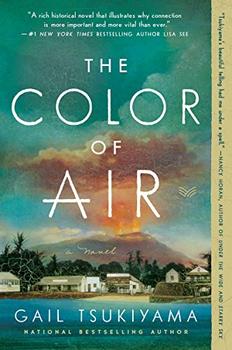Summary | Excerpt | Reviews | Beyond the Book | Readalikes | Genres & Themes | Author Bio

The new Okawa Fish Market opened two months later. Nori, Samuel, and the boys moved into the upstairs apartment, away from her in- laws for the first time. Nori loved Samuel, and marrying him young was a way to escape the memory of her own uncaring parents. But another weight had been lifted when she had a place of her own, away from the watchful eyes of her mother- in- law, a good woman who expected things done her way. "Do like this, yeah," or "No, no, not that way." For the first time in her life, Nori felt like a bird released from its cage. She bought two large iceboxes and used the long, whiskey- stained koa wood bar as a counter where customers could sit and eat. She had shelves built that lined the walls and stocked essential grocery items— canned foods, sacks of rice, beans, sugar, salt, and flour. "Survivor foods," she called them, along with boxes of matches, cigarettes, sweet and salty dried plums, and candies at the front checkout counter, just in case a customer had forgotten to pick up something at Oshima's grocery store, or worse yet, a natural disaster had rumbled through the island, leaving them completely cut off from the rest of the world.
Soon, besides selling the famous Okawa fresh fish, Nori cooked and baked in the small kitchen in back— relatives coming in and out to help— and also sold hot coffee, soda pop, sushi, sweetbread, coconut tarts, red bean buns, and whatever else could be quickly downed while working on a boat or sitting at the counter. She began serving breakfast and lunch when she saw how the locals liked to linger at the market every day, as did a pack of homeless, mostly congenial dogs waiting for daily scraps. Tables and chairs were set up not only in the market, but also out back in the yard for those who wanted to sit and linger longer. All considered the market an extension of their own homes. It was ohana, family run and founded by one of their own, and it quickly became the main gathering place in Hilo for island news and gossip.
And business promised to become even brighter in the months ahead. The railway station just down the street was expanding service to sugar mills north of Hilo along the Hamakua coast, which would soon bring in more customers as the sugar and shipping industries continued to grow. Nori was overwhelmed. She'd never expected the market to succeed so quickly, consuming all her time and energy. Every evening she put her boys to bed and headed straight for her own. Before dawn every morning Nori was downstairs at the market mixing, rolling, and baking loaves of sweetbread, breaking eggs, and frying Portuguese sausage and bacon for the dockworkers and hungry fishermen who flocked there for breakfast before they returned home to sleep. While Nori was grateful for the Okawa Fish Market's popularity, she was unprepared for all the work it involved. By her second month in business, she hired her cousin, Jelly, to work the counter full- time, and Jelly's fourteen- year- old son, Nobu, to do the stocking and heavy work, while other relatives took turns watching the boys upstairs as the market continued to grow.
By the time Nori reached the market all the locals had already gathered for Daniel's welcome home party. She sent her sons, Wilson and Mano, down to the docks to wait for Daniel to arrive, while her childhood friend Leia Natua, along with her sister Noelani, Jelly, and Samuel had laid out platters of food on the koa bar. Beer and soda pop were flowing freely. Nori was especially happy to see the jar of mango jam she'd made from Mariko's mangoes on the bar. She and Leia had gone over to the house and picked most of the mangoes in early August, the last of them used in the jam now waiting for Daniel. But the biggest surprise was that the famous Okawa Fish Market bulletin board, which hung across the entire back wall and which was usually covered with ads and announcements, was now also decorated with a banner of big block letters across it that spelled out WELCOOME HOME,DANIEL!
Excerpt from The Color of Air by Gail Tsukiyama . Published by HarperVia. Copyright © 2020 HarperCollins.
Your guide toexceptional books
BookBrowse seeks out and recommends the best in contemporary fiction and nonfiction—books that not only engage and entertain but also deepen our understanding of ourselves and the world around us.